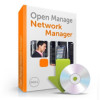Dell PowerConnect OpenManage Network Manager Web Client Guide 5.0 - Page 27
WBEM Prerequisites, Getting Started
 |
View all Dell PowerConnect OpenManage Network Manager manuals
Add to My Manuals
Save this manual to your list of manuals |
Page 27 highlights
WBEM Prerequisites The following are common prerequisites: Credentials-WBEM credentials have a role in discovering the device. Your system must have access to the computer using Administrative only credentials. These are the same credentials as the user installing WBEM on the device. Telnet / SSH credentials are necessary for other supported applications. For full functionality, this WBEM device driver requires administrative (root) access. Many devices may only allow root logins on a local console. In such cases, configure the Telnet/SSH authentication for these devices to login as a nonroot user-and, in Authentication Manager, enter su in the Enable User ID field and enter the root user's password in Enable User Password in that same authentication. This enables full device management functionality with root access. NOTE: Credentials for Telnet / SSH should have a privilege level sufficient to stop services and to restart the computer system. Firewall- Some firewalls installed on the computer may block Web-Based Enterprise Management requests. Allow those you want to manage. License-Make sure you have the correct WBEM driver license installed. Licenses come in the following types: • Major Vendor by Name - Such as Dell, Compaq, HP, Gateway. • Server/Desktop individual license support. • Generic computers - non-major vendors. • ALL - this gives the driver all capabilities for any computer system. CAUTION: If you discover an Amigopod host that does not have its SNMP agent turned on, Dell OpenManage Network Manager labels it a WMI or WBEM host rather than an Amigopod host. Getting Started The following section outlines the steps in a typical installation and subsequent first use. Because the software described here is both flexible and powerful, this section does not exhaustively describe all the details of available installations. Instead, this Guide refers to those descriptions elsewhere in the OpenManage Network Manager User Guide or online help. A typical installation means doing the following: Getting Started | Getting Started with Dell OpenManage Network Manager 27















